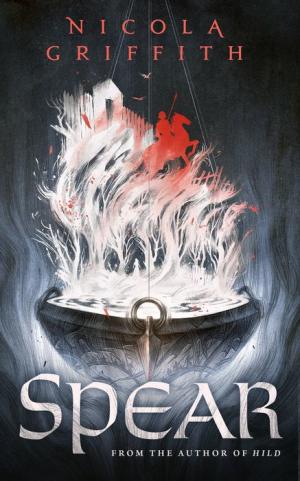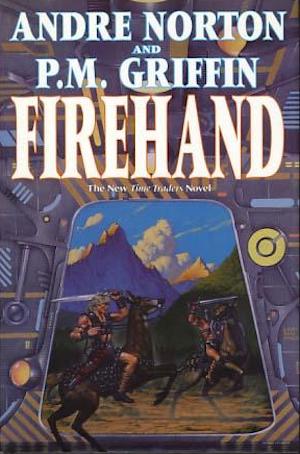There’s something to be said for completism. Now I know how Ross Murdock and Eveleen got together, and I’ve got some of the background for Atlantis Endgame. The latter builds nicely on that came before.
I’ve noted previously that different collaborators have brought different skills and strengths to the Norton canon. Some have been stronger writers than others. That doesn’t always mean the collaboration is a great success—sometimes we’re left with a book that’s more collaborator than collaboration—but it does make a difference to the quality of the whole.
The concept of Firehand is pretty much in line with the rest of the series. The Time Traders face a crisis. Messing around with time has destroyed a world. The Baldies are very probably involved. Ross, Ashe, and Eveleen have to go straight from a previous mission to this high-priority world rescue, and try to stop an ancient warlord from precipitating a series of events that will kill his planet.
Norton visited and revisited the idea that humans, at some point in their development, will inevitably blow everything up. Even a peaceable culture like the one on Dominion will, with the right degree of nudge, blast the world to slag. There’s nothing left to save; nothing and no one survives.
The event itself may take generations to happen, but if the time agents can catch the right historical moment, they can save the world. It’s a suitably desperate and urgent situation, with a beautiful planet to save, and a medieval-zoid culture to infiltrate. Ross and Eveleen impersonate mercenaries; Ashe is the learned doctor whom they’ve been hired to escort. There’s a good warlord and a bad warlord and a cast of major and minor characters. In the midst of it all, Ross and Eveleen get to know each other better, and very much like what they see.
There are some good things happening here. Eveleen gets to be a strong warrior woman, and the culture itself has a decent number of independent women and women fighters. It’s still very much male-dominated, but a little less so than it might be.
Griffin builds the relationship between Eveleen and Ross in ways that Norton would not have been able to do. She tries to honor the viewpoints of the human antagonists, too, to show why they do what they do, and to develop a little sympathy for them as they succumb to pressure from the dehumanized villains, the Baldies. The Baldies themselves don’t get the same treatment—that has to wait for Sherwood Smith’s contribution in Atlantis Endgame—but it’s a start. There’s room to build on it.
Unfortunately, as the novel goes on, the structure starts to buckle. Griffin does not have Norton’s gift for rapid, headlong pacing. The story bogs down in long sequences in which nothing much happens; events take weeks or months to unfold, which may be fairly realistic in terms of how wars and sieges tend to go, but the craft isn’t up to the Norton standard. Rather than leaping quickly from main event to event, the narrative wanders around sometimes aimlessly, sometimes repeating itself, as when Ross and six companions scout the enemy’s movements—twice, with a similar outcome each time.
The biggest plothole for me was the complete failure of the time travelers to realize that the evil warlord is being directly influenced by the Baldies. The aliens are known to mentally control their human targets, and one of the signs of this is extreme shortness of temper. The time agents themselves, especially Ross, suffer from this, as does Ross’ normally very capable Dominionite second in command. But no one ever stops to ask if the Baldies are on the planet, and whether it might make sense to track them down and eliminate them. Without their influence and their backing, the warlord will be much more easily and quickly defeated.
Buy the Book


Spear
Aside from the more or less random attacks of inexplicably short temper and general failure to figure things out, there’s one telling clue which the time agents completely miss. The warlord is paying in gold bars rather than in the rings that are normal for this world and culture. None of these supposedly trained and experienced agents catches on to the anomaly, let alone to the reason why it exists.
It’s not as if there would be no story without these incidents of plot-stupidity. Finding and neutralizing the Baldies would take up more than enough page count, especially since the aliens have high-tech weapons and mind control. Instead, the plot meanders around a war that doesn’t need to go on as long or be as destructive as it is. The agents are on this world because of the Baldies, but once they get here, they forget all about the aliens. Nor do they do something that might make sense for undercover agents to do: infiltrate the enemy and free him from alien mind control, enlist the aid of his intelligent and not intrinsically evil son (who suddenly becomes evil at the very end), and take the war straight to the Baldies.
Norton on her own would not make these mistakes. She didn’t always plot brilliantly; sometimes she’d run out of inspiration and start the whole plot over in the middle of a novel. But she kept track of all the elements she introduced, and she never let the tension sag or the characters lose focus.
It’s never the best thing when I start wanting to edit instead of enjoying the novel I’m reading. There were so many dropped balls here. Once I started chasing those, I got into pet-peeve territory, and that’s not good. The prose tries too hard to vary the references to characters. Eveleen isn’t just Eveleen, she’s the woman, the Terran woman, the weapons expert. Ross is the man, the Terran, the time agent. It’s annoying and at times confusing—is “the woman” someone other than Eveleen? Has another character entered the scene?
Just use their names. I mean. Please.
And then there’s the name for the good-guy Dominionites: the Confederates. Especially now, in 2022, this is an unfortunate choice. I don’t blame Norton and Griffin for it, they were writing in a different time, but it does catch me up short.
All in all, I’m not sorry I read this—it does fill in some gaps in the saga—but I’m moving on now. Ciara’s Song is next: another collaboration with Lyn McConchie.
Judith Tarr has written historicals and historical fantasies and epic fantasies and space operas, many of which have been published as ebooks. She has won the Crawford Award, and been a finalist for the World Fantasy Award and the Locus Award. She lives in Arizona with an assortment of cats, a blue-eyed dog, and a herd of Lipizzan horses.










